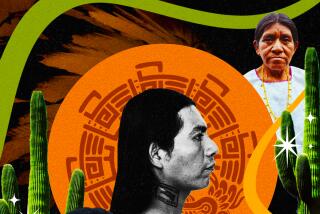Canadian Cajuns Fight to Keep Language and Culture : Lifestyle: Descendants of the first permanent settlers in America speak a quirky French that uses archaic 17th-Century words mixed with English.
SHEDIAC, New Brunswick — Canada’s Acadians, who have survived centuries of dispersion that took them as far as the Louisiana bayous, are celebrating a constitutional victory in a long struggle to keep their French language alive.
Descendants of the first permanent French settlers in America, the Acadians speak a quirky French that uses archaic 17th-Century words mixed with English.
Unlike neighboring Quebec, where a majority of the population is French-speaking, Acadians make up only a third of New Brunswick, which is dominated by English-speakers. But they are part of Canada’s only officially bilingual province.
Although Canada has both English and French as its official languages, most provinces are English-speaking. Quebec--with about 83% native French-speakers--is the only French-speaking province.
In February, Canada’s Parliament voted to enshrine in the constitution the rights of New Brunswick’s Acadians, and guaranteed them equal access to educational and cultural institutions.
More than two centuries ago the British--who were continually vying for power with the French--tried to break up this community, settled in a strategic colonial area, by scattering Acadians in small groups throughout New England.
Some went farther south and found shelter in the isolated bayou marshlands of Louisiana, where they became known as Cajuns (a deformation of Acadians) and developed their own dialect and distinctive cuisine.
Others made their way back to New Brunswick and held onto their language and customs against all odds, without schools or the support of the Catholic Church enjoyed by natives of Quebec.
Today, Acadians in this eastern New Brunswick town speak a unique “franglais” that interchanges French and English words at will, even in the same sentence.
“Ma chere, do you have le stapler la ba?” was the way a saleswoman at a department store asked her co-worker for a stapler. “Ce sera vingt-trois dollars and thirty sous, please,” she continued, asking for $23.30.
New Brunswick’s French roots date back to 1630, when the first French settlers arrived in Acadia--meaning rural paradise. A century later the English deported them.
The deportations, or “upheavals,” are still remembered by Acadians, who see it as the beginning of a history of treatment as second-class citizens.
Leon Theriault, a historian at the Universite de Moncton--the province’s only French-language university--says Acadians repopulated New Brunswick after the deportation.
“Acadians made up 6% of the population in 1871, and now we’re one-third of the population . . . and we are more aware of ourselves as a group,” he said in an interview.
Acadian organizations are working hard to instill a sense of pride in Acadians as well as a dedication to keep the French language alive.
A calendar published by the Federation of Francophone Youth of New Brunswick urges young Acadians to “work in French, communicate in French, be educated in French, and enjoy themselves in French.”
The Acadians have been fighting for equality with English-speakers for decades, but they have gained ground only recently, said James Ouellet, vice president of the Acadian Society of New Brunswick.
“After the 1755 ‘upheaval’ we . . . settled in small villages, and were confronted with the system and a strong anti-French attitude,” he said in an interview. “Since then, we’ve had to fight to regain control of everything--our churches . . . and our schools . . . and to get service in French from the governments.”
Acadians have come a long way since they were forced to do their schooling in English, but many still fear “assimilation” by the Anglophone community.
But unlike the ardent nationalists of Quebec, Acadians are not separatists and do not want to exist as a nation independent from Canada.
“The biggest difference (with French Quebec) is that we are not anti-English,” said Ouellet. “One of our objectives is to develop partnerships with the Anglo community in New Brunswick.”
More to Read
Sign up for Essential California
The most important California stories and recommendations in your inbox every morning.
You may occasionally receive promotional content from the Los Angeles Times.








